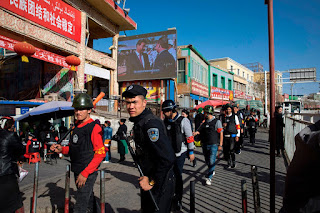Imminent Danger from Russia? A Perpetual Hoax
Although the Cold War ended decades ago, antiquated perceptions of reality remain ingrained in the minds of Americans and continue to influence the narrative that Russia is a world power whose omnipresent threat continues to this day. Last Monday night, however, Dr. Robert English––in conversation with Poly Global Scholar Ian Kim––revealed many of the misperceptions surrounding the Russia of the 1980s and the Russia of today. Firstly, he juxtaposed the Cold War-era idea of Russia as a ten-foot-tall behemoth with its current reality as an 18-inch-tall––and largely toothless––monster. Dr. English focused on Russia's political evolution across the late 20th and early 21st centuries, primarily analyzing Russia's decisions in the context of the economic collapse in the 1990s and Putin's rise to power. I was shocked to learn about the magnitude of the financial crisis in the wake of the dissolution of the Soviet Union; according to Dr. English, the closest comparable US financial crash, The Great Depression, paled in comparison with Russia's economic downfall in the 1990s. Russia's dwindling economy, which depreciated by 50%, served as the catalyst for mass starvation and resource scarcity that led to the deaths of millions of Russians. This period of death and disaster effectively crippled Russia on the world stage. Moreover, the United States vastly outspent Russia on military-building efforts towards the end of the Cold War. These factors, when considered together, painted a picture of a country with no motive nor ability to take substantial military action against the United States.
Throughout the talk, Dr. English also humanized the people and policies of Russia alike. He illuminated the realities of individuals living in a post-war society through anecdotes about his own time in Russia, where he found that people in Russia wanted to be seen and heard just like anyone else. In short, he reminded the audience that Russians were more similar to Americans––or any other nationality's people––than they were foreign. Furthermore, he highlighted the underlying motivations behind seemingly incomprehensible policy decisions such as the continued backing of Assad's Syrian government. Dr. English pointed out that while the United States is under limited nuclear threat, Russia is surrounded by nuclear powers (Pakistan, India, Iran, North Korea, etc.). As a result, Russia's influence in the Middle East is believed to be a crucial protectionist––rather than expansionist––policy decision. By recontextualizing the actions of Russia's government and its people, Dr. English dispelled many misconceptions and lingering fears I held about Russia and allowed me to gain a more nuanced perspective into both regional and global Russian foreign affairs.



Comments
Post a Comment